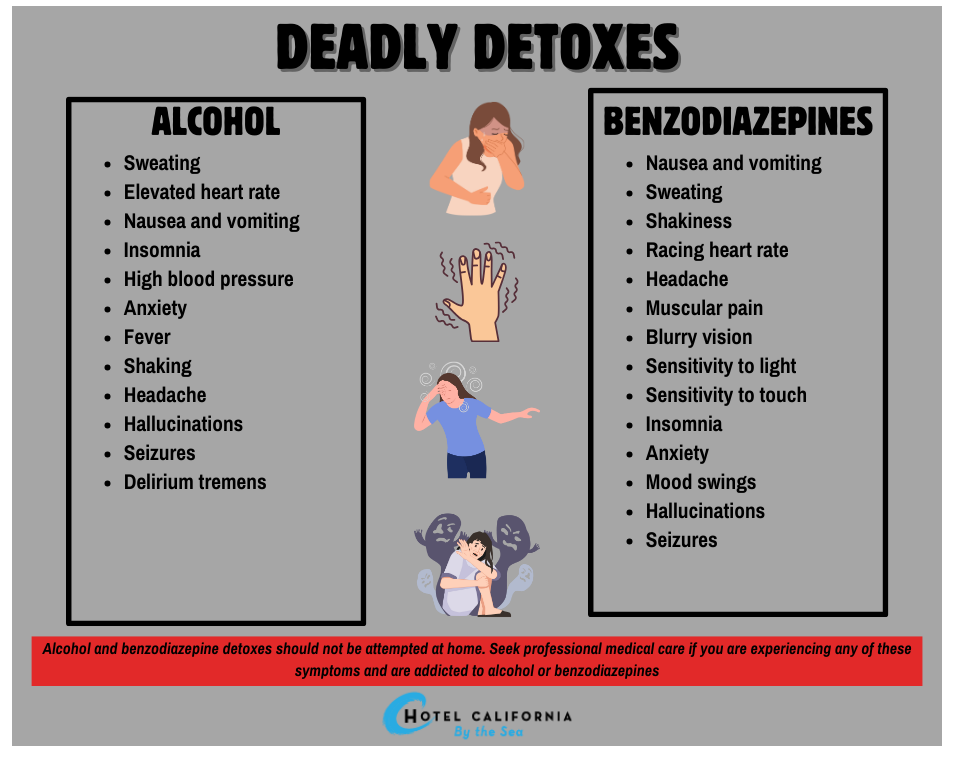What Withdrawal can you die from?
Withdrawal is a response, a physical and psychological reaction from your body when you stop using a substance that you have been using for a long time. It is your body attempting to rebalance itself to be able to function “normally” without the presence of the addictive drug. The dangers of withdrawal come from the body’s reaction to extreme changes in the chemical process in which it readjusts to return to a normal state of being before drug use.

During this process, it can send the body into chaos causing symptoms of withdrawal that can be uncomfortable, dangerous and sometimes life-threatening. Symptoms of substance withdrawal are never comfortable. In some extreme cases, it can even be deadly. Although death during or from substance withdrawal is a very rare occurrence, it can still be possible.
In extreme cases of alcohol, benzos or opioid withdrawal, symptoms of extreme dehydration and dangerous loss of body water can lead to death. However, under the care and guidance of a clinical or medical professional during the detoxing process, clients can go through withdrawal safely. Under professional detox care, clients experiencing withdrawal can avoid danger, improve recovery outcomes and decrease the risk of relapse.

Common Symptoms of Substance Withdrawal
- Anxiety
- Vomiting
- Sweating
- Diarrhea
- Depression
- Tremors
- Shakes
- Fever
- Insomnia
- Nightmares
- Heart attack and stroke
- Seizures
What withdrawal can you die from?
Can you die from substance withdrawal? Death from substance withdrawal is a very rare occurrence. However, in some extreme cases, it can happen. Death from withdrawal is more likely to happen in substances that are central nervous system sedatives affecting the GABA neurotransmitter such as alcohol, benzodiazepines and opioids.
Alcohol Withdrawal
Alcohol withdrawal occurs when a person with alcohol use disorder abruptly stops drinking or drastically decreases alcohol intake after significant long-term use. Common symptoms of alcohol withdrawal include high blood pressure, insomnia, tremors, overactive bodily reflexes, anxiety, upset stomach, and headaches.
In some cases of serious, long-term alcohol use, withdrawal can kill. Alcohol withdrawal can range from mild, to moderate to severe. When a patient begins to experience delirium tremens (DT), extreme nausea or fever, that is a sign of danger and seek out emergency help right away. DT is a serious condition that if not treated properly, can lead to death. Symptoms of DT include hallucinations, agitation, increased heart rate, high blood pressure, high body temperature, sweating, confusion, impaired consciousness and seizures.
A 2022 report found that the mortality rate for DT was between 5-15% for those who were in treatment for alcohol withdrawal. However, the mortality rate for those who did not receive alcohol withdrawal treatment, the number increased to an estimated 37%. By using FDA-approved medications under medication-assisted treatment, users can eliminate or reduce the risk of dangerous and life-threatening side effects.
Benzos Withdrawal
Benzodiazepines were introduced as an alternative medication to barbiturates. This is because barbiturates were known to cause a higher risk of overdose death. Typical benzo medications include Xanax, Ativan or Valium. Long-term use of these drugs can cause dangerous withdrawal symptoms that if not properly treated can cause death. When detoxing from these medications, gradually tapering off the drugs is the safest method.
Tapering off a substance can be a way to ease and lessen the withdrawal symptoms that occur during detox. Gradually reduce the amount or dosage of the drug until your body is able to adjust properly without experiencing drastic reactions. Tapering off medication can prevent more serious side effects from occurring. Tapering can take as long as 6 months to fully detox and be fully removed from the system.
Check Your Insurance Coverage for FREE
Find out if your insurance covers addiction treatment in minutes. We accept most insurance!
Opioid Withdrawal
Opioids are one of the most addictive substances. Common opioids include morphine, codeine and heroin. They work on your body by binding to the opioid receptors in the brain. Over time, opioids can create tolerance and dependence in which you can experience withdrawal symptoms if you stop or reduce substance intake. Withdrawal from opioids can be extremely uncomfortable but not necessarily deadly. However, in certain situations, withdrawal can lead to dehydration and that can lead to death. During opioid withdrawal, the body can experience flu-like symptoms such as vomiting and diarrhea.
When vomiting, the contents of your stomach including fluids and gastric juices are removed from the body. Your stomach then needs water and fluids to replace it. The more you vomit, the more liquid leaves your body. A similar event occurs when you have diarrhea. The contents of your intestine move through the system too quickly to be absorbed and cause an imbalance of electrolytes. This can cause water to be pulled into the intestines away from other parts of the body that need fluids.
Both of these are forms of extreme water loss during opioid withdrawal. This ultimately causes extreme dehydration. It can shrink the volume of cells, which can lead to cellular death and ultimately cause damage to other organs and body tissue. Severe dehydration can also lead to hypernatremia. This is when blood sodium levels are too high and pull fluid away from organs resulting in seizures, brain damage, heart failure or death.
Opioids are one of the most addictive substances. Common opioids include morphine, codeine and heroin. They work on your body by binding to the opioid receptors in the brain. Over time, opioids can create tolerance and dependence in which you can experience withdrawal symptoms if you stop or reduce substance intake. Withdrawal from opioids can be extremely uncomfortable but not necessarily deadly. However, in certain situations, withdrawal can lead to dehydration and that can lead to death. During opioid withdrawal, the body can experience flu-like symptoms such as vomiting and diarrhea.
When vomiting, the contents of your stomach including fluids and gastric juices are removed from the body. Your stomach then needs water and fluids to replace it. The more you vomit, the more liquid leaves your body. A similar event occurs when you have diarrhea. The contents of your intestine move through the system too quickly to be absorbed and cause an imbalance of electrolytes. This can cause water to be pulled into the intestines away from other parts of the body that need fluids.
Both of these are forms of extreme water loss during opioid withdrawal. This ultimately causes extreme dehydration. It can shrink the volume of cells, which can lead to cellular death and ultimately cause damage to other organs and body tissue. Severe dehydration can also lead to hypernatremia. This is when blood sodium levels are too high and pull fluid away from organs resulting in seizures, brain damage, heart failure or death.
- Seizures – Seizures can occur during alcohol and benzo withdrawal. If a person experiences severe or prolonged seizures, it can cause injury to the brain, permanent brain damage or fatal brain damage.
- Dehydration – Dehydration can be caused by electrolyte imbalance or through withdrawal symptoms such as vomiting, diarrhea and excessive sweating. Dehydration can lead to heart arrhythmias, kidney failure and other life-threatening organ damage.
- Cardiovascular – Stimulant substances such as cocaine can cause cardiovascular issues that occur during withdrawal such as heart attack and stroke.
- Respiratory Depression – During opioid withdrawal, a person can experience decreased heart rate and blood pressure, which can lead to respiratory depression. It can become so severe that that person stops breathing.
- Co-occurring Mental Health Conditions – People who have a history of mental health conditions are much more prone and at risk of developing serious withdrawal symptoms that can lead to death.
- Overdose – Sometimes in cases of severe addiction, during the detox and withdrawal process, users develop strong urges and cravings to use drugs. This can stem from being unable to withstand withdrawal symptoms. If a person relapses, there is a major risk for overdose which can lead to toxic build-up in the system and can lead to death.
Reach out to Hotel California by the Sea
We specialize in treating addiction and other co-occurring disorders, such as PTSD. Our Admissions specialists are available to walk you through the best options for treating your addiction.
Are you experiencing Substance Withdrawal?
If you are experiencing substance withdrawal, you should seek out medical assistance to avoid dangerous symptoms and serious risks of death. In extreme cases of withdrawal, death can be caused by the body’s response to extreme chemical changes in the brain and body as it tries to rebalance itself without the presence of drugs. An example of this would be trying to rapidly heat up a freezing cold home. When trying to do this too quickly, can ultimately break the thermostat. When trying to readjust too quickly, the body is unable to handle the extreme reaction and can lead to death.
Behavioral health treatment programs such as Hotel California by the Sea provide support through every aspect of substance use disorder treatment. In our detox program, we offer 24-hour medical supervision as well as medication-assisted treatments. We also provide inpatient residential and outpatient treatment programs. We utilize evidence-based treatment methods such as CBT, DBT and group therapy in addition to medication management treatments. Hotel California by the Sea believes in treating every aspect of a person’s addiction in order to help them live a happier and healthier life in recovery.
References:
https://www.alternativetomeds.com/blog/withdrawal-can-you-die
https://www.healthline.com/health/substance-use/can-you-die-from-opiate-withdrawal
https://npaddictionclinic.com/blog/do-people-die-from-drug-withdrawals
https://www.medicalnewstoday.com/articles/can-alcohol-withdrawal-be-fatal
